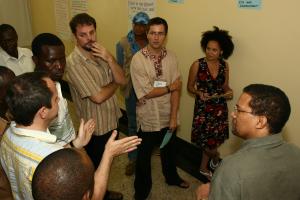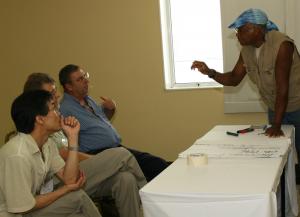
Affordable internet access
Figures for 2008 show wide regional disparities in access to the internet. Almost three-quarters of North Americans and half of Europeans were connected to the internet. However just a quarter of Latin Americans are online and the picture in Asia and Africa is far worse. Only fifteen out of every hundred Asians are online (with a large percentage of those coming from just a few countries) and just five in a hundred Africans2. There are also divides between urban and rural internet provision and a new divide has emerged: the broadband divide. To be able to run today’s applications, dial-up is no longer enough. It is essential to have sufficient, affordable bandwidth. The challenge of extending universal affordable access to the internet remains a primary focus for APC.
Nevertheless, low percentages of usage can still translate into large numbers of users. Even in Africa, more than 50 million people now have some access to the internet. Such figures, linked to the dramatic increase in the number of people using mobile phones, constitutes an enormous opportunity for using ICTs to improve social justice and development.
Particularly significant are two related factors: the convergence between the internet and mobile networks, and the extent to which the spread of mobile phones has made it possible for people to participate in the creation and sharing of information in multiple ways, overcoming social and geographical barriers.
Some of the most innovative uses of mobile telephony, such as monitoring human rights, early warning systems (monitoring migration, conflict, natural disasters), election monitoring, financial transactions, sharing public health information and reporting of domestic violence, are central to the civil activism that is important to the APC community. The same processes also pose new challenges in terms of policy, regulation, development of applications, building capacity and so on. Of particular importance will be ensuring openness in the mobile space, from open standards and content to freedom from censorship.
Making ICTs work for a sustainable environment
Increased use of ICTs is both a hazard and a potential aid to a sustainable environment. Energy consumption by internet networks, particularity server infrastructure, has grown exponentially, as has electronic waste. Unless the ICT sector pays serious attention to renewable energy use and the prevention of unnecessary waste, the potential of the internet to provide alternative ways of working to reduce carbon footprints will be outweighed by the harm it does. The UN Development Programme’s (UNDP) Development Report 2008, notes that “climate change is the defining human development challenge of the 21st century” because it exacerbates existing poverty and developmental challenges and intensifies conflict over resources. The APC network needs to respond to these challenges through the creative use of ICTs to help people adapt to, and mitigate the impact of climate change.
Online content and internet rights
Civil society organisations were early adopters of ICTs. They created and hosted websites and mailing lists and recognised the significance of the internet in the expansion of globalisation. The spread of the internet has facilitated the impact of civil society networks, through its use for research, collaboration, campaign coordination, media outreach and exchange of information across borders.
The explosion of a more interactive internet has made it easier for people to put content online as illustrated by the rise of “citizen journalism” and the viral spread of social networking sites. This interactive web has also affected political society as online campaigning by politicians illustrates. Yet what remains unclear is who owns and controls this content once it is online – the hosting site or the creator? Is privacy being respected? And on a technical level, are the sites using open standards that will guarantee the future of a free and open internet, or are they locking users into their systems with proprietary protocols?
What are the implications of all this for civil society networking? How should we respond to the contradictions between democratisation of information on the internet, (particularly through peer-to-peer networking and user generated content) on the one hand, and, on the other hand, increasing private ownership and commercialisation. Not surprisingly, the internet has become a site for contestation between governments, the private sector, users and civil society organisations. This is intensified by new technologies that enable tracking of people’s online movements for political and criminal ends, as well as to ‘enhance’ the user’s experience and maximise commercial gain.3
“The battle over the institutional ecology of the digitally networked environment is waged precisely over how many individual users will continue to participate in making the networked information environment, and how much of the population of consumers will continue to sit on the couch and passively receive the finished goods of industrial information producers”.4 People need to get off the couch! APC has condensed the opportunities and threats in an internet rights charter with seven themes, including internet access for all, freedom of expression, access to knowledge, shared learning and creation; privacy and surveillance and transparent and inclusive governance. It will be crucial to engage actively with internet policy and technological development to ensure that these rights are recognised, respected and enforced.
The internet as a global public good and strengthening the information commons
APC’s rights-oriented approach to the internet is rooted in the network’s belief that the internet is a global public good and that its development and governance should reflect this. We also believe everyone should have access to the internet so that they can play a part in building a global information commons where information and knowledge is freely available and collectively shared.
The commons issues of importance today are not so different to those APC sought to address in its early years. Both prior to and since 1990, the APC community has sought to provide access to and defend a global commons for the provision of information that was impossible to source as quickly and easily at the time.
The overarching challenge in strengthening the global commons is to counter the predominant closed and proprietary nature of policy, practice and culture that currently governs the production and dissemination of information. This includes challenging restrictive intellectual property regimes, frameworks that govern access to and use of spectrum, the use of closed and proprietary standards that are used in the development of information and communication technologies (including mobile telephony). It will involve persistent advocating for free and open access to knowledge, ideas and teaching methodologies.
Creative engagement with emerging technologies
As online websites and tools become increasingly user-oriented and user-generated, developers and users from the global south have greater access and influence. In spite of this, most civil society organisations still struggle to be aware of, and negotiate the constant change and the multitude of options available to them.
There’s a danger in believing that what’s newest is what’s best. Technology choices need to be about the people and the task that needs to be done, not the tools themselves.
Disturbingly, awareness of the political and economic potential of free and open source software appears to be on the wane, in spite of the stability and ease of use of present-day FOSS platforms.
Social change activists need not only just make use of the internet, but they need to understand how it works, and what the implications of moving much of their important work online are. This involves being aware of risks; to individual safety (for those working in surveilled environments or for those vulnerable to various forms of exploitation), privacy (for all users), to computer and information security (e.g. virus attacks). It requires reflection on the impact of the ubiquitous internet on cultural diversity and community identity. It requires awareness of accessibility to people with disabilities.
Improving governance, including the governance of the internet
Improved governance at local and national level is a prerequisite to sustainable social justice and development. Public participation, access to information, transparency and accountability shape the ways in which people are able to influence and monitor policy and implementation. Civil society and social movements have a critical role to play in keeping governments accountable. Their capacity, including their ability to use ICTs effectively, need to be strengthened – even more so at a time of global economic insecurity when governments may be tempted to apply draconian laws in order to quell social unrest.
Governance of the internet to ensure that it is recognised and managed as a global public good consistent with human rights is a major challenge. However in the last few years, we have seen that in the process of developing governance in this relatively new area, the mistakes and exclusion that characterise so many other areas of global governance can be corrected. Internet governance needs to be transparent, accountable, and accessible to public participation and ensure a free and open internet. In doing so, it can also serve as a role model for policymakers in other sectors.
This article is extracted from the APC Action Plan for 2009-12. A summary of the plan will be available in the publications section of APC.org.
***************
1) The term commons comes from the Middle Ages and referred to the land or common grounds that villagers shared for collective needs such as grazing their animals. The “information commons” can be roughly defined as an open online space which is collectively built and where information and knowledge is freely shared.
2) http://www.internetworldstats.com/stats.htm – accessed on 4 February 2009.
3) Jonathan Zittrain: The Future of the Internet – And How to Stop It, Yale University Press, 2008
4) Yochai Benkler: The Wealth of Networks, Yale University Press, 2006, p385
Photos: Mihaly Bako